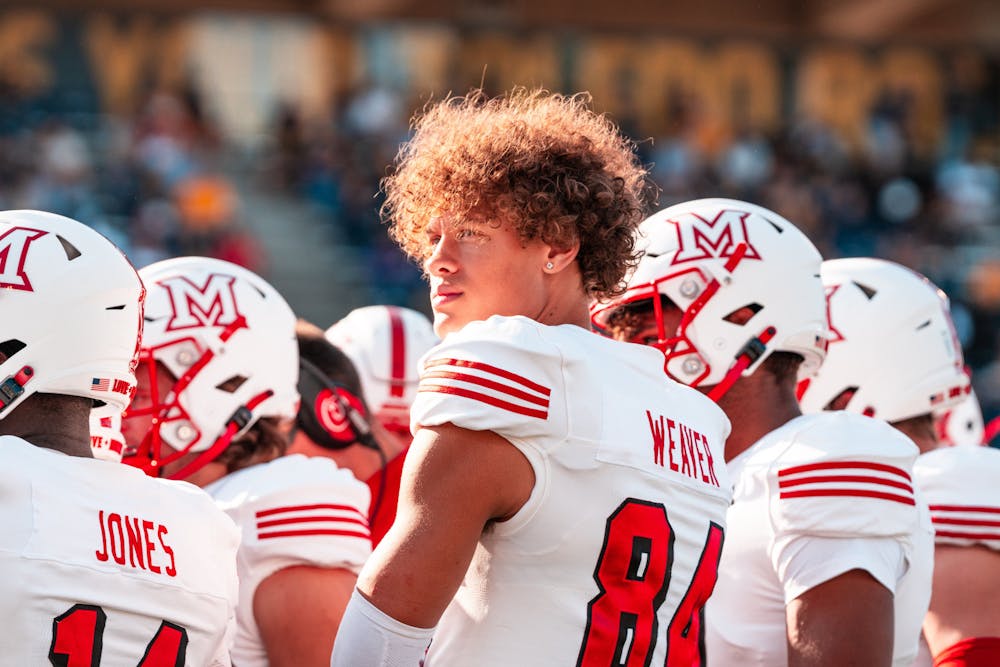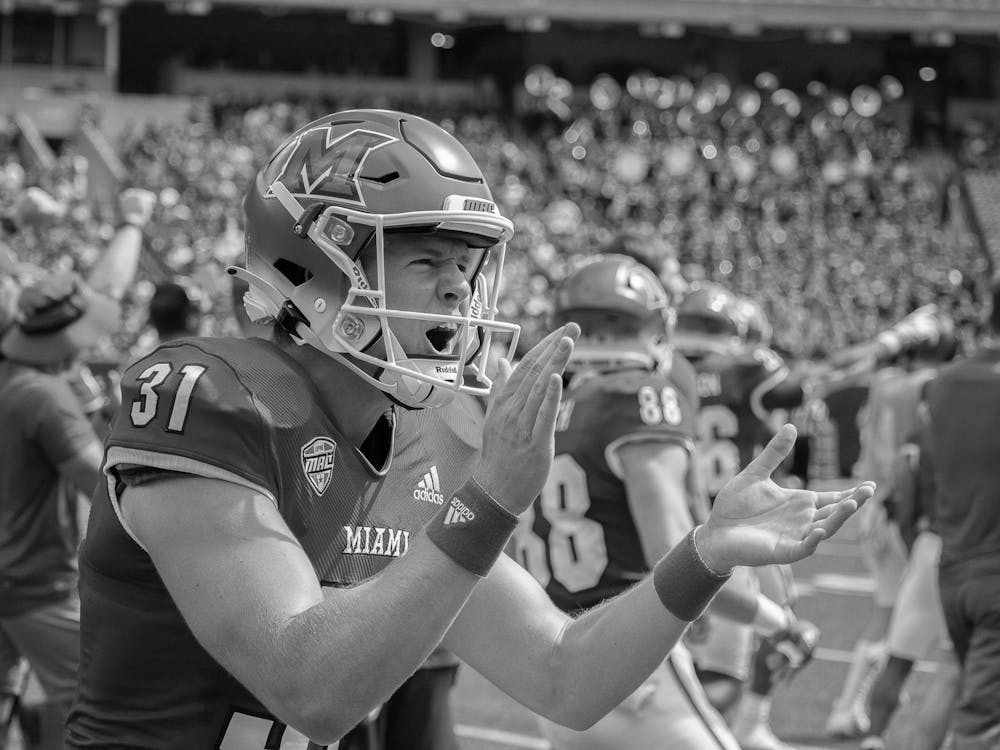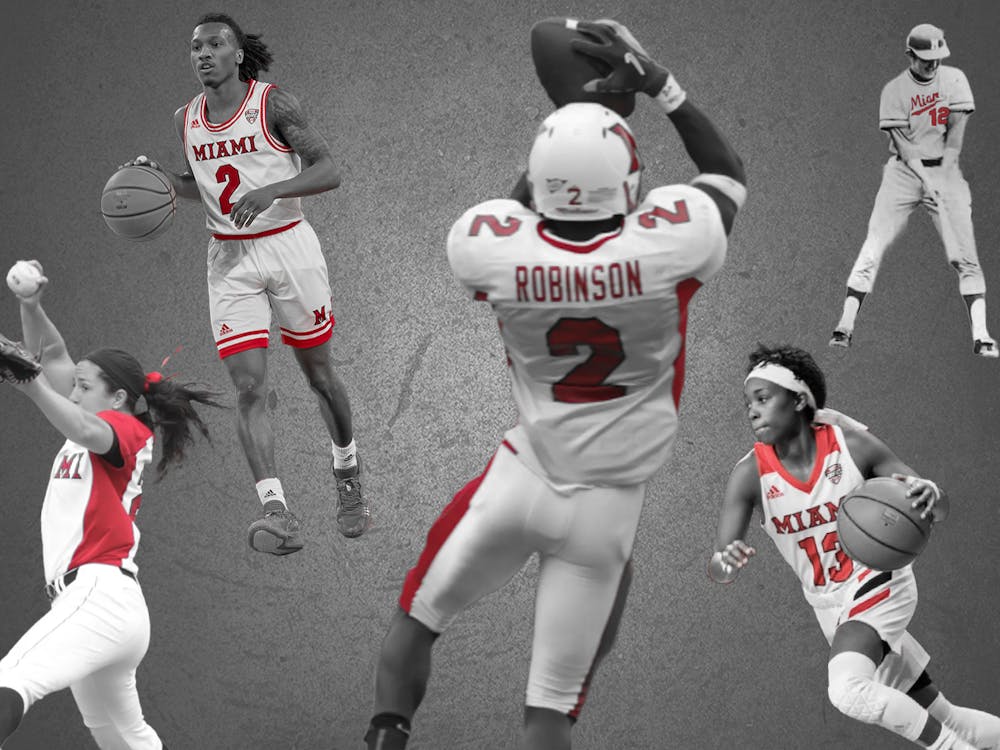Standing at 6-foot-5 and weighing 220 pounds, it’s impossible to tell from a glance that Cole Weaver struggles with dietary restrictions. But as soon as the conversation starts, it’s a part of his life he’s not afraid to delve into.
The redshirt first-year wide receiver’s life has revolved around receiving the proper nutrition to keep his strength and conditioning at an elite level.
He has had to find new ways to do so at Miami University due to his food allergies.
“It was definitely difficult,” Weaver said. “Being here, I talked to some of the dieticians at the dining halls, and they have allergy-free options. So I’ve worked around it just by getting a lot of meat, rice and stuff like that just trying to avoid [my allergens].”
Growing up in Roswell, Georgia, Weaver has dealt with food allergies all his life. However, he didn’t know they were allergies until a fateful morning during his sophomore year at Blessed Trinity Catholic High School.
After an adverse reaction to two sausage, egg and cheese biscuits and a coffee before school, his mother suggested they see a new allergist to address the issue.
Thanks to that decision, Weaver found out he had allergies to eggs, dairy and gluten.
Weaver’s symptoms include fogginess, digestive issues and hives. However, if he had continued with his same high school diet, he likely would have required an epinephrine pen, used to treat severe allergic reactions that cause anaphylactic shock, which involves nausea, swelling and difficulty breathing, sometimes leading to death.
According to Food Allergy Research and Education (FARE), approximately 33 million Americans have food allergies, with 51% of adults reporting a severe reaction. The rate is only growing.
As a result, people like Weaver are ever-present around the country and more common on Division I college sports teams.
Weaver’s successful senior year saw him win his team’s most valuable player and first-team all-region honors. When he arrived at Miami, the first person he talked to about his diet was Paul Eversole, the associate director of wellness services and head athletic trainer for the football team.
Eversole sees players from different backgrounds come and go, but his experience with Weaver was one of appreciation for his work on the field and his willingness to seek help off it.
Enjoy what you're reading?
Signup for our newsletter
“I think every player matures at their own rate, and I think he came in as a mature kid,” Eversole said. “It takes a mature kid to come in and ask for help. That’s not easy for everybody, so he was mature enough to come and talk to us and say, ‘Hey, I’m having trouble with this. Is there somebody I can talk to?’”
Eversole and the team doctors directed Weaver to Miami’s sports dietitian, Julie Vasilak.
Vasilak officially started her position at Miami in May. Her work involves assisting every athletic team and on-campus dining services.
“Every department, every sport, has an opportunity to use me as a resource,” Vasilak said. “ I always have opportunities for one-on-ones, and we manage what we need to. For some people, it’s more food relationship-based. Some are more nutrition-based, and then others it’s the stress of just navigating being a college athlete.”
With outside help, Weaver has navigated his nutrition on campus. But when the team goes on road trips, it presents a new set of challenges.
“The team meals [are] a lot of stuff I can’t eat,” Weaver said. “There will be mashed potatoes or bread, but I just try to avoid those. Sometimes, I pack my own stuff, and I find my workarounds, but it’s definitely hard on the road.”
The training staff also plays a huge part in the health and safety of the players on the road. While they aren’t the ones providing team meals, they’re looked to if someone has an allergic reaction.
Eversole and his staff communicate with the team doctors about who has what allergies via notecards in their two trunks, the main one dubbed “Nurse Betty” and the sideline trunk named “PA Steve.”
These traveling training rooms not only hold all the necessary equipment and medicine to treat allergic reactions but also hundreds of cards with player names, positions, numbers and allergies.
“We have everything we need to take care of a kid if they have an allergic reaction to whatever it is,” Eversole said. “Some of them have EpiPens, so we travel with all of that and have it with us on the sideline.”
Whether they’re on the road or at home, maintaining peak shape as an athlete with food allergies is not for the faint of heart, especially considering the allergies Weaver has. Maintaining a diet while avoiding food that could make one sick takes a multi-faceted approach.
However, Weaver has persevered. The way others perceive his allergies or the mental and physical tolls undereating or general anxiousness have taken on him has not stopped him from finding the best route to keep his body in shape.
“It’s going to be hard,” Weaver said. “It’s going to be difficult, but you have to push through. I tell people about it, and they might not view it as much of a problem, but it really is.”
For any other high-level athletes struggling with food allergies and maintaining a healthy diet – two concepts that appear diametrically opposed on the surface – it’s okay to ask for help.
“When your ankle hurts, you see the athletic trainer and the doctors,” Eversole said. “When you’re struggling in a class, you see a tutor. If you’re struggling with your diet, see a dietitian; the sports dietitians are really good.”
Food allergies grow more common by the year, and plenty of people struggle to cope with a health issue that may seem small on the surface but is life-altering.
Many can relate to Weaver’s story, athlete or not. But his message of continuing forward and, most importantly, asking for help is the key to finding new options while avoiding any situations that may put those dealing with these allergies in danger.




